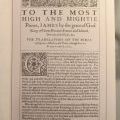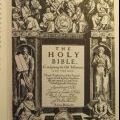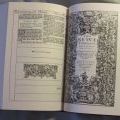The Best Cure for KJVOism: A Real 1611 KJV

It has been widely publicized that the year 2011 is the 400th anniversary of the original publication of the “Authorized” or King James Version of the Bible in English. Historically, this translation has been the most widely used, at least since it overtook the previous champion, the Geneva Bible of 1560 (chiefly, at least initially, as a result of the legal suppression of the printing of the Geneva Bible by the British monarchy, in favor of the KJV).
Note, however, that the great majority of the editions and copies of the KJV printed and read in the past 400 years have been revisions rather than reprints of the original form of the KJV, with literally tens of thousands of revisions in spelling, punctuation and the use of italics, plus many hundreds of revisions in the precise wording of the text. Later editions also included the switch from “black letter” (“Gothic”) type to Roman, the widespread omission of the Apocrypha in the 18th and later centuries, along with the omission of an extended calendar and charts of biblical genealogies. Most unfortunately, later editions omit the extremely important and informative introductory essay, “The Translators to the Readers,” which was included in the original edition. In short, most KJV users, particularly those who claim to be “King James Version 1611 Only” in their beliefs, have never actually seen or used a real 1611 King James Version in the original form in which it was issued from the press in 1611.
Past facsimiles
In the past facsimile reprints of the 1611 KJV have been produced from time to time. In 1833, “The Holy Bible, an exact reprint page for page of the Authorized Version published in the year 1611” was printed at the University Press, Oxford. It featured Roman type.1 In 1911, the University Press at Oxford issued two 1611 reprints—the first a facsimile (in black letter) in reduced size of the original 1611 KJV, the other an exact reprint page-for-page but in Roman type, both with introductory essays by A. W. Pollard.2 I have owned a copy of the 1911 Roman type reprint for almost 35 years.
This 1911 Roman type reprint was reissued in the 1970s (or early 1980s) by Thomas Nelson of Nashville, about the time they issued their New King James Version (and for a time Nelson sold the two volumes together in a slipcase). This reprint omitted the Pollard essay (and perhaps other features—I gave my copy to one of my sons a few years ago and cannot check it directly). Later—probably in the 1990s—Hendrickson Publishing also reprinted the 1911 Roman type edition (in precisely the form Nelson had). These two recent reprints are easy to find via the Internet.
Besides these, over the years various publishers have produced several full-sized facsimile reprints of the 1611 KJV. My brother has a copy of one made in the 1950s, for which he paid $350, used, a decade ago. Such full-sized facsimiles are rarely seen and are generally rather pricey (in the hundreds or even many hundreds of dollars).
An affordable new facsimile
Now, another edition, widely available and quite inexpensive, has appeared. This one is made by Zondervan and sold at Wal-Mart (and perhaps other retail outlets). The ISBN is 978-0-310-44029-1. It is a facsimile—an exact reproduction in the original black letter script—of the 1611 edition, but in a reduced size, and with one feature of the original omitted—the thirteen books of the Apocrypha (as noted on p. viii of the Introduction to this new edition). That the 1611 KJV originally did have the Apocrypha can be visually confirmed in this edition on the page containing Malachi 4, where the “catch-word” at the bottom of the page is “APO-” which points to “APOCRYPHA” which is at the top of the next page in the original (and in my 1911 reprint), after which originally followed the complete text of those non-canonical books. [amazon 0310440297 thumbnail]
The printed retail price of this Zondervan 2011 facsimile reprint is $7.99, though I have bought several copies at Wal-Mart in Kansas for $4.97. I have heard it priced about a dollar higher elsewhere (and I suspect they hope to make a profit on the publication of the KJV at that price). I would strongly urge every preacher, every Christian reader and every church and Christian college library to get a copy at once. If you have any KJVO friends, buy and give them a copy. There is no quicker cure for KJVOism that the direct and extended study of the 1611 edition, introductory material and all.
One finds in the actual, original, genuine 1611 KJV (no doubt “preserved in the form God wants us to have”) an introductory essay that states the translators’ perspective on their own and other translations (they, at least, were decidedly not “KJV-only”). If I could do just one thing to combat KJVOism, I would have every KJVO believer carefully read those eleven, highly informative pages. The original translators’ English Bible text has literally thousands of variant marginal renderings (showing that they did not believe their translation as found in the text was infallibly correct), plus variant manuscript readings, showing that they did not believe that the manuscript reading given in their text was necessarily always right. One will also find numerous places where words are “omitted,” “added” or altered as compared with all modern editions of the KJV, to say nothing of a considerable number of printer’s errors (are these also part of the “perfect preservation” we hear so much about?). And one can discover on the title page of the NT those revealing words: “cum privilegio” (Latin: “with privilege”) which demonstrate the fact that this translation was copyrighted from the day it was first published (contrary to the misrepresentation on this point that is often part of KJVO teaching).
I am quite sure that the quickest “cure” for KJVOism is the close and careful study of the actual original KJV itself. I would challenge—even dare—everyone of KJVO persuasion to get this facsimile of the original KJV and study it cover to cover and margin to margin, spending a year and more in the process, and try to prove me wrong.
(Photos of a copy of the Zondervan 400th anniversary facsimie 1611. Click to enlarge.)
Douglas K. Kutilek Bio
Doug Kutilek is the editor of www.kjvonly.org, which opposes KJVOism. He has been researching and writing in the area of Bible texts and versions for more than 35 years. He has a BA in Bible from Baptist Bible College (Springfield, MO), an MA in Hebrew Bible from Hebrew Union College and a ThM in Bible exposition from Central Baptist Theological Seminary (Plymouth, MN). His writings have appeared in numerous publications.
- 402 views
And if they did not understand the older English, they could purchase the booklet from the ABS that contains the original preface in a facsimile, the same in Roman type and an updated “translation” of the preface.
Then again, perhaps the whole KJVO thing is a judgment on the arrogance of Americans.
But for those that do, a 1611 facsimile is a great eye opener. The margins are full of “or this” and “or that” alternatives.
(The very unprofessional photos are mine. Picked up a copy yesterday for the church library.)
Bill… I’m curious: what does “the arrogance of Americans” have to do with it?
Views expressed are always my own and not my employer's, my church's, my family's, my neighbors', or my pets'. The house plants have authorized me to speak for them, however, and they always agree with me.
I also appreciate knowing there are inexpensive copies out there. Everyone’s looking for a deal!
Is that what you’re getting after, Bill?
Striving for the unity of the faith, for the glory of God ~ Eph. 4:3, 13; Rom. 15:5-7 I blog at Fundamentally Reformed. Follow me on Twitter.
In short, I agree with the author that having a copy is a good defense against most unthinking KJVO-ism, but it also shows just how good and usable the 1611 still is, even though it isn’t ideal for many who aren’t educated in reading skills. I’d like to have one of these in e-format to add to my iPhone, but that probably seems backwards to most.
I did just order one of the new reprints to be able to have one with the old Gothic type.
Dave Barnhart
"Some things are of that nature as to make one's fancy chuckle, while his heart doth ache." John Bunyan
[Bob Hayton] Most people in Europe are bilingual. Contrast that with Americans who believe earnestly that their country is superior to all others, and that people coming to their country should just learn English.Well, since I married a German citizen, I determined to learn German and I did. I fully expect to use it and I do when I am in Germany, which is fairly frequently. However, by the same token, I do in fact expect people coming here to learn English. That’s not just an American perspective. Germans expect that people immigrating there learn German. I’ve read plenty about that in their news and commentary. Like us, they are concerned about immigrants not integrating themselves into the culture. For an extreme example of this, try traveling to France sometime. I’ve noticed that many will only attempt English with you if you demonstrate that you know another besides English, even if it isn’t French. (When I did that, they almost invariably concluded that I was Swiss, not American, since of course, Americans are anything but bilingual.)
I do appreciate the perspective that learning another language has given me on the whole Bible translation issue, and how difficult and complex it is, and why the KJV doesn’t really matter to non-English speakers.
(By the way, even though I think immigrants to America should learn good English, I’m not one of those who thinks we should take the KJV to other countries and attempt to force them to learn English to read the Bible, just in case the argument in your post was going that way.)
So I do think your point about Americans’ arrogance and English is well taken, though I think believing people should speak English in America is not really part of that problem.
Dave Barnhart
(In “another life,” I was a bookstore manager at FBBC. People would come in looking for the 1611, and I’d take them to the only copy we had - the Nelson facsimile. The puzzled looks were rewarding. ;>D)
I am for accurate, literal translations, of which the KJV is one (of the few), but it is just that — a translation (or more accurately, the 5th revision of the Tyndale NT). I like to jokingly refer to myself as “New King James Only,” as I admire the marginal references to the NU and M texts (in the spirit of the KJV translators in giving accurate information about alternative or ambiguous translating options).
Thanks for writing the article. An honest look at the true “original KJV” would silence most KJVO views and statements. The Letter to the Translators is wonderfully written, and could precede any newer (good) translation or revision. It is definitely something worth promoting (it has been published by itself, as I have a copy, but I cannot find reference to it on Amazon). Along with facsimile pages, these are GREAT tools for teaching the truth about translations.
For the Shepherd and His sheep, Kevin Grateful husband of a Proverbs 31 wife, and the father of 15 blessings. http://captive-thinker.blogspot.com
We’ve asked Germans before how they would describe Americans in one word and inevitably the word seems to be “proud.” The same might be said about all sinful humans, but we Americans seem to take the lead.
But that point was also a generalization - always dangerous and REALLY dangerous on a blog. :)
[B-Lowry] Aaron, et al, the fact that most Americans speak only English and their attitudes towards all other languages, etc. was what I was referring to. And yes, more than once we heard the word “proud” or “arrogant” used of Americans while we were in Germany.Yes, it’s kind of sad. I pretty much WAS one of those before I married a European… I mean, of course everything is always better here, isn’t it? Amazing how actual information shoots down a lot of your assumptions.
But that point was also a generalization - always dangerous and REALLY dangerous on a blog. :)Well, that particular generalization is pretty easy since Americans generally make themselves easy targets in this area.
Originally, I was really only responding to the part of Bob’s post that mentioned expecting people to speak English when they come here. I think that’s a separate topic from being arrogant about thinking the whole world should just learn English, even when we are visiting *their* country.
Dave Barnhart
Dave (dcbii) said:
“So I do think your point about Americans’ arrogance and English is well taken, though I think believing people should speak English in America is not really part of that problem.”
I would actually agree, to a certain extent, with the last line. I was more describing America and how it might be perceived that this is not wise. However, while I think immigrants should seek to learn English, it often will take more than one generation. Sometimes our insistence on English smacks of racism, to a degree. It took the Swedes two or three generations before the Swedish speaking churches around here in Minneapolis, adopted English. I find that thought enlightening in the whole immigration debate. But that is definitely a topic for another day and another thread!
Thanks again,
Bob
Striving for the unity of the faith, for the glory of God ~ Eph. 4:3, 13; Rom. 15:5-7 I blog at Fundamentally Reformed. Follow me on Twitter.
Views expressed are always my own and not my employer's, my church's, my family's, my neighbors', or my pets'. The house plants have authorized me to speak for them, however, and they always agree with me.
Rest easy. The other languages are just fictitious (Klingon, Hobbitese). No need to worry. (worry-eth?)
For the Shepherd and His sheep, Kevin Grateful husband of a Proverbs 31 wife, and the father of 15 blessings. http://captive-thinker.blogspot.com
Ask an Irishman what he thinks of the Birtish; ask most Europeans their impression of the French; ask the Turkish, Dutch or African people what they think of the Germans; Ask the Germans what they think of the Chinese. They will all answer with “Arrogant” or “Proud.” I have had South American Christians tell me that certain other South American Christians who come to Europe trying to change everything are “arrogant.” Americans do not have a corner on pride. Pride often has to do with power, or the perception of power.
Germans have likewise told me to my face that Americans are stupid, and that the downfall of the US is imminent because Americans practice such poor nutrition. Whenever my freinds begin to wax eloquent this way, I respond, “Like McDonalds, you mean.” “Yes, that too,” they respond. “Well,” I answer, “that’s your problem. We all know that there is only one superpower in the world, the US, and that the Americans have been devouring McDonalds hamburgers for decades. Maybe people here are missing something!”
All that said, it is a bit of arrogance to propound to people of a different language that one of your English translations is better than anything they have ever produced. After all, how many American preachers had the entire Latin NT memorized, like Martin Luther, before they began translating?
Bill and David: die Ablenkung bitte verzeihen!
Jeff Brown













Discussion